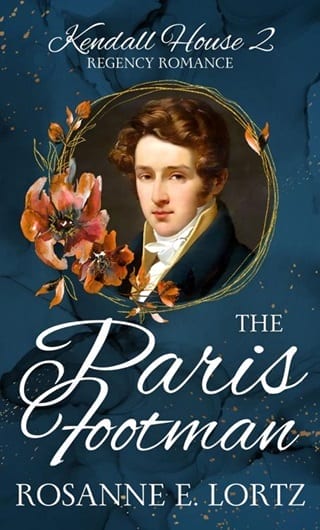34. Josephine
Chapter thirty-four
Josephine
T he Empress Josephine did not greet them herself at the door, but an imposing collection of staff performed the function for her. Louisa learned from the housekeeper that Cosette would have a trundle bed in Louisa's own dressing room, Jacques would have a bed above the stables, and Gyles would be assigned a room belowstairs with other servants arriving for the house party. "When shall we meet her highness?" asked Louisa, curious as to the schedule of the house party.
"At dinner, milady," said the black-gowned domestic. She looked Louisa over appraisingly and seemed to approve of her modish carriage dress and feathered hat. "You must already be aware that her highness expects formality in dress. Her own attire sets the standard for all of Paris."
So that was how it was? Only the best for Empress Josephine. Perhaps the empress had omitted the common courtesy of greeting guests at the door so she could dazzle them more readily when she appeared in splendour on the grand staircase .
After Cosette had explored every corner of the rooms assigned to them and emptied the trunks into the wardrobes, she set about perfecting Louisa's toilette. Louisa sat silently at her dressing table, having no appetite for engaging in chatter with her lady's maid. Finally, it was time to examine the finished product.
"Does milady prefer these gowns to your English ones?"
"Yes," said Louisa, looking at her forest green dress in the cheval glass. The square necklines she had worn in London had never displayed her bosom and her height to the best advantage, but the deep curving drape of the Roman-style gown emphasised her figure. Small bronze brooches pinned the unfastened shoulders of her gown, and the white skin of her shoulders peeked through the green velvet.
"And your hair? Is it better than what your English maid could do?"
"Grasping for compliments?" said Louisa dryly. She was not in charity enough with her maid to offer them. She brushed her fingers over the soft curls of honey-gold hair that framed her face. "You do well enough. If the portraits I've seen are accurate, I shall be quite the contrast to the Empress Josephine."
"She favours white—it sorts well with her black hair, and maybe she thinks it makes her look younger. She has kept her figure quite well, even though she is old enough to be une grand-mère ."
The empress was of an age with Mrs. Audeley? Louisa reflected that Mrs. Audeley would make a kind and understanding grandmother when Gyles finally married and had…children. She swallowed convulsively, dismayed by the picture of Gyles as a happily married country swain with a bouncing baby on his knee. His unknown wife loomed silently in the background of her imagination—no doubt, some Derbyshire miss who delighted in soil, and sunshine, and horticulture.
"And perhaps white was the colour all the women wore in Martinique," said Cosette, continuing to babble on as dressers of hair often do, "for it keeps one cool, and they say the Caribbean is warm."
"Is Empress Josephine from the New World?"
" Oui, she grew up there until she sailed to Paris to find a husband."
"How curious," said Louisa. She looked up at Cosette. "But it sounds as if you disapprove?"
Cosette wrinkled her nose. "I would not go to Paris, milady, if I were on the lookout for a husband. The best ones are found in the countryside with their plough and yoke of oxen."
"Are they indeed?" murmured Louisa. She imbued her voice with a tone of disdain. "I would not have imagined that a fine lady's maid like you would dream of rustics."
That seemed to quiet Cosette. She finished her work with deft hands, creating a circle of curls at the crown of Louisa's head. Louisa looked at herself again in the cheval glass. No, this was not the face of a gentleman-gardener's wife.
Alphonse was waiting for Louisa in the reception room when she descended for dinner. Indeed, the whole house party was waiting there for their hostess. Would Empress Josephine continue to keep them waiting? As the dinner gong rang, a force of nature entered the room with dark hair, sparkling eyes, and an elegant figure swathed with white silk.
Louisa's first impression was of Josephine's vivacity which masked her age and made her seem much younger than she was. Her second impression was of her voice, a low enchanting sound like golden bells that promised pleasure for everyone who listened.
"Ah, Phonsie, you have returned," Empress Josephine said, approaching the Comte Dammartin and depositing a kiss on his cheek. "And this must be your cousin? Or should I say, your wife ?" Josephine laughed, a low, soothing laugh that Louisa wanted to find disagreeable but reluctantly found enthralling. She noticed that however much the empress laughed and smiled, she never opened her mouth far enough to reveal her teeth.
"How do you find Paris, Lady Louisa, after the barbarous society of London?"
"Very civilised, your highness," said Louisa, offering a curtsy. To answer anything different would have been impossible.
"You agree, then, that London is barbarous?" Josephine's eyes fastened on Louisa with the inscrutability of the Egyptian sphinx.
"Perhaps not as barbarous as the Caribbean," said Louisa. She held her breath. It was a calculated quip that would either give offence or intrigue the empress—she hoped for the latter.
Josephine paused. " Parbleu! You are very bold, mademoiselle . But you are accurate. The Caribbean was barbarous, I admit it. My father owned an estate called Malmaison there, and it truly was a bad house . It was nothing compared to this estate that I have built for myself here in France— my Malmaison." She took Louisa's arm in hers. "After dinner, I will show it to you. And tomorrow, my gardens."
Riding the tide of royal good will, Louisa allowed herself to be pulled into the dining room on the arm of the empress while her cousin trailed closely behind them. The other guests arranged themselves according to precedence and followed, Louisa's only claim to the seat of honour being that she had captured the empress' interest. The Général Archambeau who had so enjoyed her company at the Paris salon took the seat on Louisa's right, and Alphonse managed to insert himself on the empress' left.
The empress kept a lavish table with game from her estate and preserves made from her own garden. Louisa's father had always had expensive tastes, but even his palate would have been satisfied by the platter of roast peacock and the lobster served in the shell.
"More punch, milady?" asked a voice over her shoulder. Louisa looked up. Over the last two months, she had become used to seeing Gyles' face at her elbow, dishing food onto her plate with a serious smile. The black-haired footman in Josephine's livery was a disappointment. "Non, merci, " said Louisa, placing a hand over the rim of her glass.
Josephine, who had already drunk three glasses, began to laugh. "I see my Caribbean rum is not to your liking, Lady Louisa. I find it sorts well with the lemon and the cinnamon. I can rarely go to sleep without a glass of punch before bed."
Alphonse manfully took a drink of his own glass of punch. "It is an acquired taste, your highness, but for your sake, I have acquired it."
"Of course you have," said Josephine indulgently, looking at Alphonse as if he were a pet spaniel or pug. "You always do what you can to please me. I wish I could say the same for my husbands."
"Your highness has more than one?" asked Louisa, deferentially.
" Mais oui!" Josephine looked at her in surprise. "You are too young—or too English—to know my full history. I escaped the Caribbean and came to Paris and there I married a very dashing soldier. His name was Beauharnais. A general, like the gallant Archambeau sitting beside you."
The grey-moustached general saluted Josephine with a courtly nod from his place beside Louisa. She could see that he was sitting a little taller in his chair now after their hostess had singled him out. It was an effect that Josephine had on men.
"Beauharnais gave me my children, Eugene and Hortense, but he was not a generous man in anything else. We did not sort well together, and during la révolution , he had many enemies." Her dark, expressive eyes opened wide. "They sent him to Madame Guillotine."
Louisa made the appropriate sound of sympathy.
"It was a difficult time," acknowledged Josephine. "There are many things I had to do to survive. Some criticised me—"
" Non! " said Alphonse, tossing back a glass of the rum punch. "You were magnificent. You were the toast of Paris."
"And what would you know about that, mon enfant? " asked Josephine. "You were no older than my little Eugene at the time."
Alphonse made a face and reached out to take her hand. "I know you, my empress. You could not have been otherwise."
Josephine laughed. "You fresh-faced flatterer. Just like Napoleon." She turned to Louisa. "He was six years younger than me, you know, when he saw me the first time. His mother did not like it. His sister did not like it. But he was so filled with fascination for me that he would not let me be. He insisted that we marry, and how could I say no?"
"How indeed?" said Louisa. Her questions had shown merely polite interest up until now, but suddenly, she was seized with the desire to know more. "Was it a…love match?"
Josephine laughed. "Oh, he loved me in his way. He still does, despite divorcing me for his Austrian broodmare. But it is only as men are capable of love—utter devotion when they remember you and a wandering eye when they forget. While we were married, the emperor had as many lovers as I have fingers."
She lifted her small hands and flourished her ringed fingers while Alphonse made a moue of horror. "Do not gasp, Phonsie! It is the truth. And then, when he divorced me earlier this year, he gave me the most ridiculous present. A model of an Egyptian temple, half the length of this table. Faugh! I sent it back to him again. I do not want your silly antiquities. I want Malmaison, I said."
"And you have it," said Louisa. "You have the house and the estate."
"Yes," said Josephine. "That is the essential thing. You will learn this, Lady Louisa, that a husband may live or die, lovers may come or go, but to have one's own property and independence, that is the essential thing."
"Your highness is very wise," said Louisa, lifting her glass of rum punch to salute her hostess. She noted the triumphant gleam in Josephine's eye as the empress looked around the green satin walls, the rich brocade drapes, and the chequered black-and-white marble of her dining room. She had come through revolution, ruination, and royal intrigue unscathed and now had time to devote her life to all the pursuits she herself enjoyed. She was a woman who would be envied by most.
But casting a look at the deep-set eyes beneath the carefully placed curls, Louisa had a fleeting suspicion that the former empress was not as happy as she claimed to be. She was independent. She was a property-owner. But she was also…alone.
 Fullepub
Fullepub 



